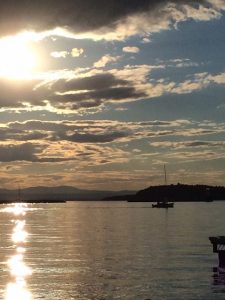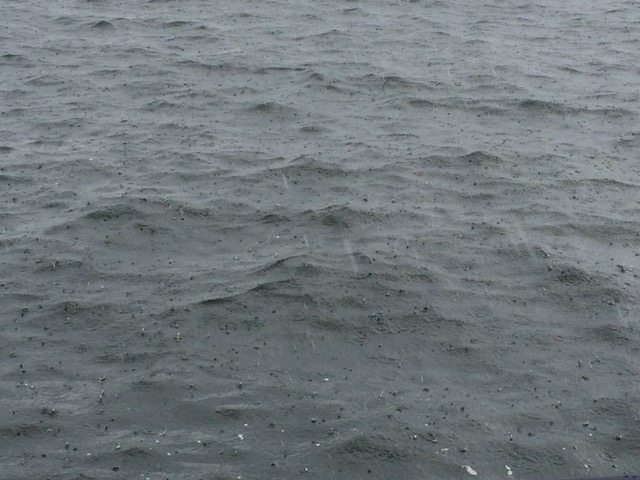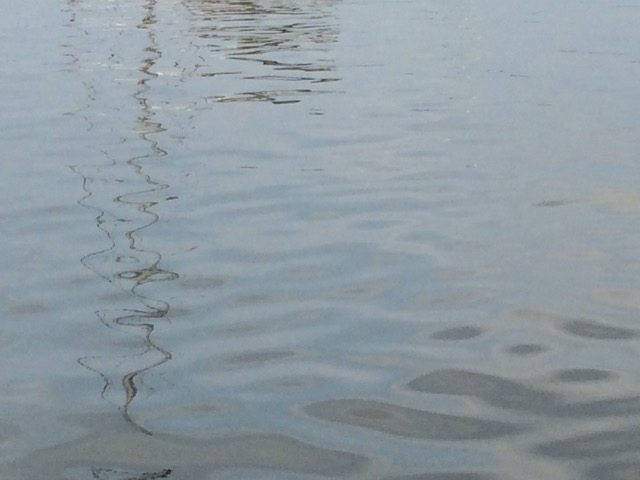July 18th, 2016
There is no question that water – seeing it, smelling it, hearing it, being in it, can calm and help heal. Perhaps ancient peoples recognized the hygienic effects of water. Swimming and bathing in warm waters helps aching joints, and the exercise is of course healthy.
 As I sit on a boat on Lake Champlain in Northern Vermont, I can smell the earthy fragrance of the lake and hear the lapping of the gentle waves upon the hull. Why did this give me a sense of calm?
As I sit on a boat on Lake Champlain in Northern Vermont, I can smell the earthy fragrance of the lake and hear the lapping of the gentle waves upon the hull. Why did this give me a sense of calm?
Perhaps it was because it reminded me of many summers visiting my sister and brother-in-law at their “camp” on Methuen Pond outside of Boston. That brought my thoughts to those times as a medical student when I would take a tiny Sunfish sailboat out on the Charles River that separates Boston from Cambridge, Massachusetts. Digging deeper into my memory, I remembered the summers when my sister and I used to visit our best friend’s family cottage at Lac Nominingue – one hundred and twenty-five miles north of Montreal, or when we would visit my aunt and uncle and cousins at their rented cottage on Trout Lake, only sixty miles north of Montreal.
I remembered swimming in the bracing water and running back to the house shivering, in Nominingue to stand in front of the warm fireplace; at Trout Lake to have a lunch of macaroni and cheese, which my aunt had at the ready for us teeth-chattering children. With our parents we sometimes would drive south from Montreal to Vermont, New Hampshire, or Upstate New York, and stay in little pine paneled cottages next to running brooks, where we would step from stone to stone. So, water for me was all these memories rolled into one – memories of vacation, family, friends, and love.
 Now, since moving to Tucson, Arizona in 2012, I spend summers with my partner, telecommuting from Vermont. On weekends, from our boat on Lake Champlain, I look out over the ever-changing water towards the hills and mountains – Vermont’s Green Mountains, and New York’s Adirondacks. It is a meditation.
Now, since moving to Tucson, Arizona in 2012, I spend summers with my partner, telecommuting from Vermont. On weekends, from our boat on Lake Champlain, I look out over the ever-changing water towards the hills and mountains – Vermont’s Green Mountains, and New York’s Adirondacks. It is a meditation.
 When floating on six trillion gallons of water – Lake Champlain is the “sixth Great Lake” – it is hard to imagine that there are places on earth where there is none. In Tucson, I have become acutely aware of lack of water, and carefully monitor my use of it. We rejoice when the Rillito River, most of the year a dry riverbed, occasionally fills with water after a storm. People line up to photograph the roiling waters charging past.
When floating on six trillion gallons of water – Lake Champlain is the “sixth Great Lake” – it is hard to imagine that there are places on earth where there is none. In Tucson, I have become acutely aware of lack of water, and carefully monitor my use of it. We rejoice when the Rillito River, most of the year a dry riverbed, occasionally fills with water after a storm. People line up to photograph the roiling waters charging past.
When the monsoon rains come to Tucson in summer, or the quieter steady rains in early spring, the desert bursts into bloom – subtle by Vermont standards, but dramatic against the backdrop of rocks and scrub. When it rains all day or all night in Vermont, I appreciate all the more the greenery that follows and the profusion of wildflowers in the roadside and fields.
While the desert holds many charms, how awful it would be without water all the time. The contrast makes me all the more conscious of how important it is to preserve this most precious of all our commodities.